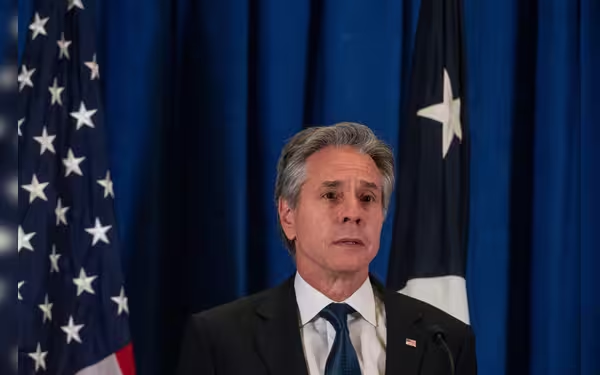Saturday, November 16, 2024 03:22 PM
Blinken Challenges China's Peace Efforts Amid Russia Support
- Blinken questions China's peace initiatives in Ukraine.
- China supplies significant military resources to Russia.
- Wang Yi defends China's actions against U.S. criticisms.
 Image Credits: arabnewspk
Image Credits: arabnewspkBlinken raises concerns over China's peace claims while supporting Russia in Ukraine conflict.
In recent discussions at the United Nations General Assembly, U.S. Secretary of State Antony Blinken raised serious concerns regarding China’s role in the ongoing conflict in Ukraine. This dialogue comes at a time when tensions between the United States and China have been escalating, particularly in light of China's support for Russia amidst the war. Blinken's remarks highlight the complexities of international relations and the delicate balance of power that exists in today's geopolitical landscape.
During a meeting with Chinese Foreign Minister Wang Yi, Blinken questioned the authenticity of China’s peace initiatives in Ukraine. He pointed out that while China claims to advocate for peace, it simultaneously allows its companies to supply military resources to Russia, which he described as fueling the "war machine" of President Vladimir Putin. Blinken stated, "When Beijing says that, on the one hand, that it wants peace, it wants to see an end to the conflict, but on the other hand is allowing its companies to take actions that are actually helping Putin continue the aggression, that doesn’t add up." This statement underscores the contradictions in China's foreign policy and raises questions about its true intentions.
According to Blinken, China has been a significant supplier of military production materials to Russia, providing 70 percent of machine tools and 90 percent of microelectronics necessary for military equipment. This information is alarming for the United States and its allies, particularly in Europe, who are concerned about the implications of such support for Russia's military capabilities.
In response, Wang Yi defended China's position, asserting that China has not directly supplied weapons to Russia and emphasizing that the U.S. should cease its criticisms and sanctions against China. He stated, "The US should stop smearing and sanctioning China and refrain from using the issue to create divisions and provoke bloc confrontations." This exchange illustrates the ongoing tug-of-war between the two nations, each accusing the other of destabilizing actions.
Moreover, the conversation between Blinken and Wang reflects broader global concerns. Ukrainian President Volodymyr Zelensky criticized both China and Brazil for their calls for negotiations to end the war, equating such pressure on Ukraine to colonialism. This sentiment resonates with many in Ukraine who feel that their sovereignty is at stake.
As the world watches these developments, it is clear that the relationship between the U.S. and China is fraught with challenges. Blinken's warnings about China's actions in the South China Sea and its economic practices further complicate the dialogue. Wang's insistence on mutual respect and dialogue suggests that both nations recognize the need for communication, even amidst their disagreements.
The discussions between Blinken and Wang Yi at the UN highlight the intricate web of international relations that defines our current global landscape. As nations navigate their interests and alliances, the stakes are high, not just for the U.S. and China, but for the entire world. The path forward will require careful diplomacy and a commitment to dialogue, as the consequences of missteps could be dire. Understanding these dynamics is crucial for anyone interested in the future of global peace and security.













